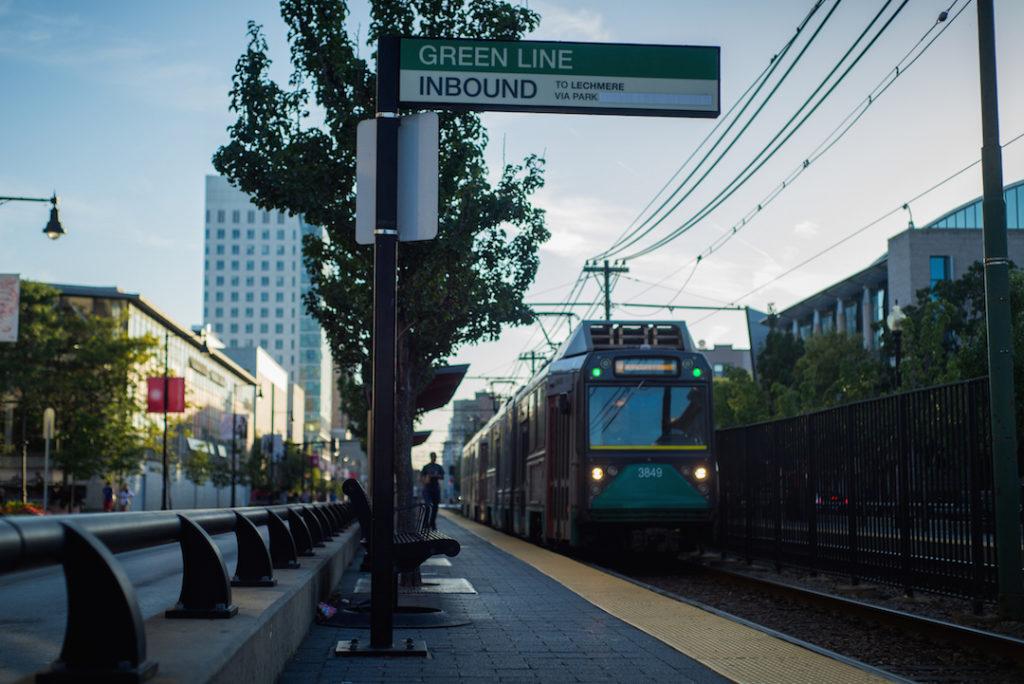By Jose Castillo, news staff
The planned extension of the Massachusetts Bay Transportation Authority (MBTA) Green Line into Somerville and Medford is facing a budget shortfall of between $700 million and $1 billion, and few decisions have been made regarding the cost overruns weeks after officials announced the problem on Aug. 24.
“This setback requires changes to the project and/or additional sources of funding, as well as reconsideration of whether [the Massachusetts Department of Transportation (MassDOT)] and the MBTA can continue with the project,” wrote MBTA General Manager Frank DePaola in an undated press release posted to the project website after the announcement.
The money—in addition to the nearly $2 billion previously budgeted for the construction—would be used to build seven stations and around 4.5 miles of track going from Lechmere Station in Cambridge to Union Square in Somerville and College Avenue in Medford.
Northeastern University assistant professor of public policy and urban affairs Dietmar Offenhuber said despite cost overruns, the extension is important to the area’s businesses and residents.
“Infrastructure such as public transportation is a key factor for the development of contemporary cities,” Offenhuber wrote in an email to The News. “Especially East Cambridge and Somerville, which have a tremendous growth in residents and workplaces.”
Completing the project would resolve transportation problems in both Somerville and Medford, Offenhuber said.
According to a document provided by MassDOT, Somerville is the densest city in the state of Massachusetts, yet has limited access to public transportation. Only 20 percent of residents there live within walking distance of a rail station, and the city has only two train stops, Davis Square and Alewife. Sixteen MBTA bus lines travel through parts of Somerville, and six others have endpoints at Alewife.
“With the road and freeway network fully developed, public transportation and bike paths are pretty much the only option left to increase mobility in the region,” Offenhuber said.
Extending the Green Line would increase that percentage to over 70 percent, officials say in the planning documents posted on the project website. MassDOT also estimates that the Green Line extension will reduce travel times by 75 percent and lead to economic development.
According to Offenhuber, it would be wise for MBTA officials to keep such benefits in mind and accept that the extension may not make money for the state itself anytime soon.
“It is a bit shortsighted to think about a subway line as an operation that should generate profit rather than a necessary investment into the current and future development of Boston,” he said.
Sophomore bioengineering major Roisin Floyd, a lifelong resident of Massachusetts who has been riding the Green Line for nearly ten years, agrees that the extension will be important to residents, students and others.
“You would think that Somerville being such a dense city would push those in charge to really work hard on this,” Floyd said. “Even if you don’t take into consideration the city’s density, the economic benefits are obvious. I know that when commuter lines were extended, jobs and businesses followed.”
The ballooning price tag is only the latest obstacle to the project, which has faced several roadblocks over the last decade.
One week after MBTA officials had originally announced the extension plan, the Boston Globe reported a price increase from $438 million to $559 million.
In 2005, the Conservation Law Foundation (CLF) sued the MBTA after the project was slow to materialize. The CLF demanded that the project be completed in response to the increase in traffic caused by the Big Dig, the highway megaproject that frequently encountered price increases and engineering problems.
By 2009, then-Governor Deval Patrick sought federal funding to pay for half of the elevated price tag of $934 million. After federal funding was applied for in 2011, documents showed a $1.4 billion cost. Last September, new cost estimates totaled nearly $2 billion.
After historical winter storms shut down the T earlier this year, Governor Charlie Baker formed a special committee to address the MBTA’s problems, including the Green Line extension. However, administration problems have still occurred.
Members of Baker’s special committee have stated that the costs were both unexpected and unfeasible. According to the Boston Globe, proposals – some of which were discussed at a MassDOT board meeting Wednesday – to cut cost include downsizing stations, changing original walkway and bike path plans, and altering maintenance and storage facilities.
If the extension proceeds as scheduled, stations will open at Lechmere, Union Square and Washington Street by 2017, with another four stops completed by 2020.
Photo by Scotty Schenck















